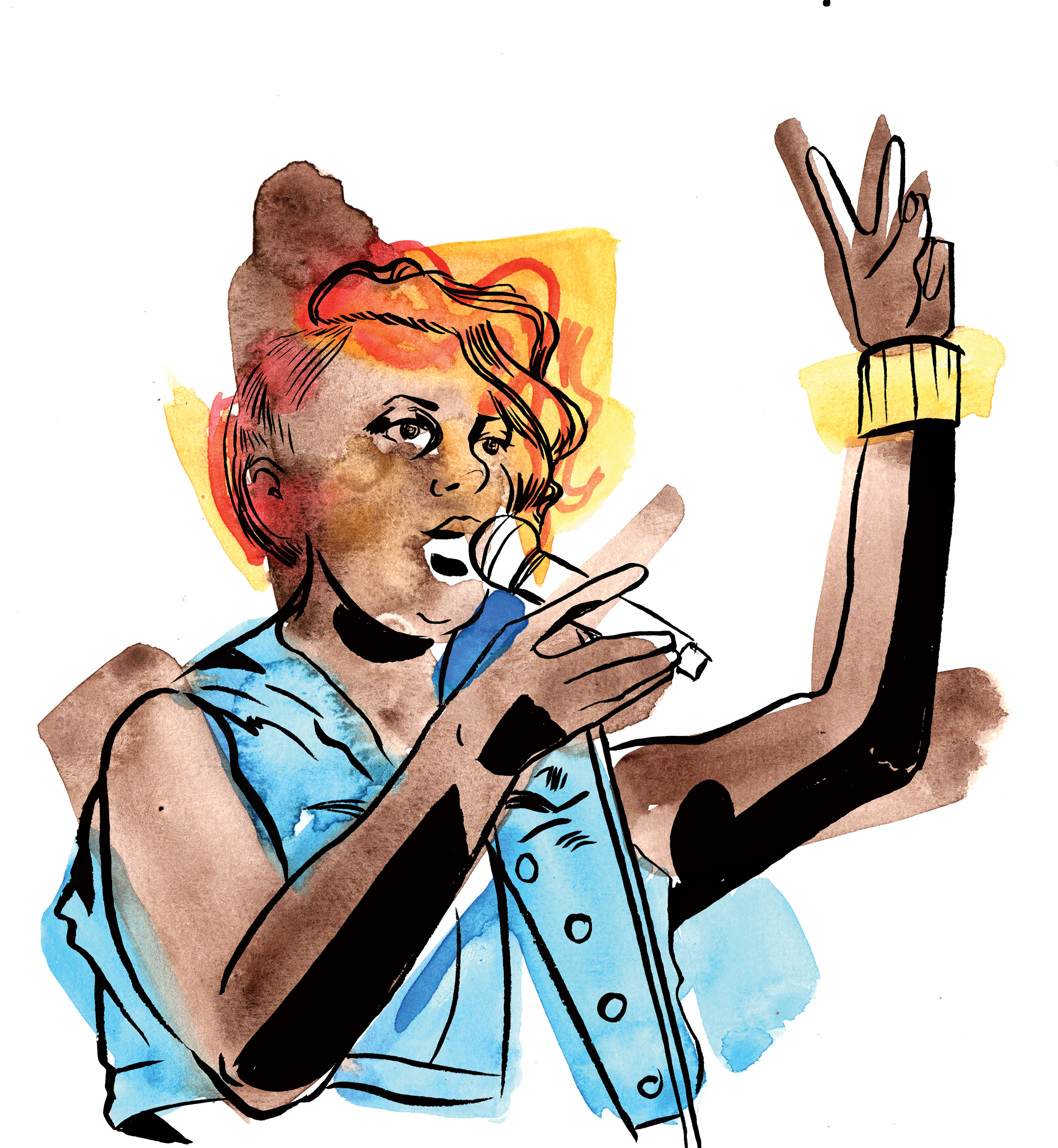
Good things happen when two smart women share margaritas and fresh chips and salsa.
It happened at Garcia’s two years ago, when writer-performers Rosamund Lannin and Carly Oishi met for the first time and founded “Miss Spoken,” a live lit show that reserves the stage and the mic exclusively for “non-dudes.” On the last Wednesday of the month, at scruffy-but-lovable Gallery Cabaret, audiences are presented an evening of fresh, original, “lady live lit” based on a theme.
“I love hearing women talk and I think women’s stories are telling,” said Lannin, a project manager and editor of Story Club magazine. “I love comic books and fiction and movies, and a lot of that is pretty male-dominated […] both in terms of who makes it and who’s the main focus. That gets really old and sad. You get sick of girls never being the main event, or represented one-dimensionally.” Active in the live lit scene herself, Lannin saw room for a series that would feature female writers specifically.
The same thought had occurred to Oishi, a blogger, three-time “Write Club” champ, and co-creator and former co-producer of “Solo in the 2nd City,” a reading series that gave Chicago singles a chance to publicly bemoan their love lives.
“I was living with my amazing friend, activist, teacher, and all-around badass feminist, Alicia ‘Swiz’ Sowisdral,” Oishi said. Sowisdral is founder of “Slut Talk,” a comedy and storytelling series that features women’s personal tales of slutdom; as well as the comedy showcase and open mic, “Feminist Happy Hour,” at The Whistler.
“She was a really big influence in my life,” said Oishi, “someone who helped me discover my feminism.” Oishi knew her next project had to be one where women were the centerpiece. When she met the like-minded Lannin, everything fell into place.
What’s Live Lit Got To Do With It?
Some may argue that “live lit” (“lit” as in “literature”) is just a rebranding of the public reading, which is by no means a new idea. But the liberal blending of standup, storytelling, and an open-mic is what makes live lit different than the staid reading. Live lit is way more popular, too, judging from the proliferation of shows that have popped up in just the last five years, and the huge audiences that attend them.
“Live lit brings in a lot of great elements from stand-up and improv,” said Lannin. “I feel like performing adds depth and feeling to to the personal essay format, makes it more engaging and immediate and fun. I love reading personal essays, but there’s something that grabs you about seeing something performed by the author.”
“Selfishly, live lit is everything I’d been looking for,” said Oishi. “I have a theater, music, and writing background – it’s the perfect fit.”
Ladies’ Night
She’s not alone. In Chicago, there are something like 30 live lit shows a month. In this environment, a specialty show like “Miss Spoken” can find the talent and those who will support it.
Audience numbers are the most visible example of this support; the hat passed during “Miss Spoken” is another (performers split the pot). But it’s the audience’s respect for women writing on the theme of consent, for example, that makes the difference.
“I think part of the acceptance [of our show] is having an awesome, supportive crowd,” said Lannin. “I get concerned sometimes we’re performing in an echo chamber. Let’s be real: who comes out to a lady live lit show in a liberal neighborhood in an urban area? But then a guy will come up afterward and be like, ‘I had no idea it was like that’ and his female friend is like ‘Oh, any woman could tell a story like that,’ and you can see the gears shifting. That’s amazing.”
Lannin says that hearing many women tell variations of the same story shows “we’re not making it up.” The “it” might be multiple orgasms or the experience of rape; while a woman broaching such topics at other live lit events in Chicago is unlikely to be treated with open hostility, when she says “rape” or “gun” at “Miss Spoken,” nobody flinches.
Writer Tori Szekeres has performed at “Miss Spoken” twice: Once at the “BFF” show in 2015, and once at the “Mix Tapes” show earlier this year.
“The stories at ‘Miss Spoken’ are universal to women of different incomes, education levels, ethnicities and stages of life,” said Szkeres. “Women need to know that we’re all in this together,” she added. By participating in a show that celebrates women’s writing, Szekeres feels she’s legitimizing women’s stories in a landscape that doesn’t always.
Get In Formation
“Miss Spoken” is curated, meaning Oishi and Lannin plan the lineup ahead of time and there’s no open mic. This shouldn’t discourage new folks; the hosts say around half of the people who have been in the show approached them first. For female writers interested in reading (trans and queer writers who identify as “non-dude” are welcome, too), the first step is to check out the show — with a bunch of your friends, of course.
Headed into its third year, “Miss Spoken” has taken its place at the Chicago’s literary table. (Their Facebook page shows more than 600 likes and is a good way to stay up-to-date on events and performers; the slick podcast can be found here.)
“Being successful in live lit is sort of elusive,” said Oishi. “I feel like as long as people keep showing up and saying good things about their experience, then we’ve done our job and we’ve done it well.”
Check out F’s Chicago Live Lit Roundup here.






